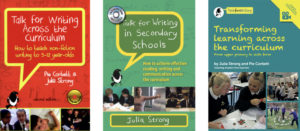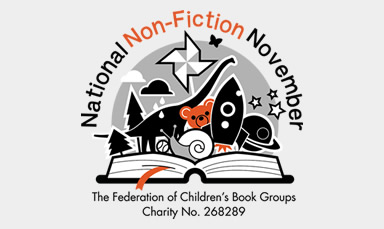Ten resources to help you get the most out of Non-Fiction November.
6 November, 2020We may associate November primarily with Guy Fawkes and fireworks, but it is also National Non-Fiction Month. National Non-Fiction November was set up by the Federation of Children’s Book Groups (FCBG) as a way of promoting reading non-fiction for pleasure. Discover our Top 10 resources to help you get the most out of this annual celebration of all things factual.
Finding the right books:
As with any reading category, finding quality titles is key to ensuring that children will enjoy their reading experience. So, let’s start with some places you can go to find great non-fiction books.
- The theme for this year’s National Non-Fiction November is The Planet We Share and the FCBG has put together a Booklist of over 100 titles that highlights some of the best books on the theme for primary and secondary students.
- Books for Topics, as its name suggests, provides booklists for popular primary topics that include non-fiction titles. The Books for Topics blog also has a review section for non-fiction books.
If you are looking for the pick of the most recently published titles, then award shortlists are always a good place to go. Here are three awards for children’s non-fiction that include students in the voting process, providing a great opportunity to engage children in book talk in a way that feels relevant and topical.
- The Blue Peter Best Book with Facts Award has announced its shortlist for the 2021 Awards. The winner will be chosen by Year 5 and 6 students from 12 primary schools across the country and revealed in March 2021. Although the deadline to apply to be one of the official school judges for this year has closed, schools can still run their own judging process. Applications to be one of the school judges for the 2022 Awards will open in September 2021.
- Congratulations to all the winners of this year’s SLA Information Book Award! The Information Book Award selects the best information books in three categories – Under-7s, 8-12 and 13-16. The winners are chosen by a panel of book and educational experts, but students can also vote for their favourites in the Children’s Choice Award on the SLA website. The shortlist for next year’s award will be released in May 2021 and schools will then have until the end of October to register their Children’s Choice votes.
- The Royal Society Young People’s Book Prize celebrates excellent, accessible STEM books for under-14s. The winner of the 2020 Award will be chosen by a panel of over 13,000 young judges and will be announced in February 2021. Visit The Royal Society’s website to find out more about this year’s shortlisted titles and how to apply for your school to be one of next year’s young judging panels, all of whom receive a free set of the shortlisted titles.
Help with non-fiction lesson planning:

- Support your teaching of non-fiction writing with three texts that use the recognised Talk for Writing approach, developed by Pie Corbett, supported by Julia Strong.
- Educational consultant, Jane Considine, has produced a range of over 100 English Unit Plans for years 1 – 6 designed to help teachers save time on planning and improve the standard of pupils’ writing. The Unit Plans cover fiction and non-fiction and are available to download on a subscription basis from Jane Considine Education.
Develop your knowledge base with a non-fiction CPD course:
- Subject Matters from Just Imagine is an online CPD course for primary teachers that develops an understanding of the reading demands of a subject discipline and provides practical, research-based strategies for teaching with non-fiction in history, geography and science. The course is delivered over three x 90-minute webinars.
Start date: 26th January 2021. Cost: £75 ex VAT for three sessions.
- Non-fiction in the Primary School from Centre for Literacy in Primary Education is a two-hour webinar that explores the importance of choosing and using non-fiction in the classroom to increase pupils’ motivation and attainment as independent readers and writers.
Start date: 4th December 2020. Cost: £45
- Disciplinary Literacy CPD from National Literacy Trust. Part of NLT’s online training programme for secondary teachers, this range of online courses explores the literacy skills required across the secondary curriculum and provides practical strategies for improving reading and writing in different subject areas. Courses are delivered by NLT consultants to a group of up to 12 participants on a mutually agreed date. Schools are responsible for setting up the group.
Cost: from £550 per group.
Non-fiction rarely receives the review space or airtime that fiction does, but it has an important part to play in any school or class library. We hope this list provides some inspiration for your National Non-Fiction November.
Fun Fact
You can find lots more resources to help you meet the demands of the literacy curriculum on the Literacy Hive website. Start your search here.

